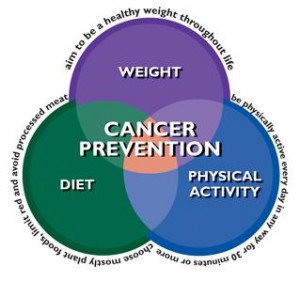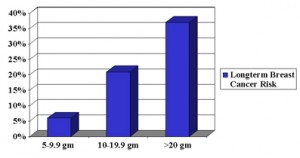A lot has been said about choosing a healthy lifestyle in the prevention of cancers, but there is even better news now. It is not too late to make a switch to healthy living for those who have been diagnosed with cancer to reap significant benefits.
Dr. Bruce Johnson, director of the Lowe Center for Thoracic Oncology at the Dana-Farber Cancer Institute says that it is helpful to impress on cancer patients to cut down on fat and to exercise more in order to reduce their risk for recurrence. Dr. Jeffrey Meyerhardt, an assistant professor of medicine at Harvard Medical School, also points out that in the past studies have shown that physical activity can lower the risk of developing colon cancer, but his new research is the first to suggest a benefit for people who already have the disease. A study including 832 patients with Stage III colon cancer who had been treated with surgery and chemotherapy showed that the cancer survival rate (where no disase was present) was 49% higher in those who were moderately active. The activity was either a two to three mph walk, six days a week, or other equivalents: running fast two times a week, or playing tennis three times a week.
In a second study breast cancer was investigated in a group of patients who adopted a low-fat diet. Compared to those who continued to eat their regular food they were about one-fourth less likely to suffer a breast cancer recurrence in the next five years. This report comes from Dr. Rowan Chlebowski at the Harbor-UCLA Medical Center in Los Angeles. This was a larger study involving 2,437 women ages 48 to 79 years. The goal was to reduce fat intake to 20% or less of daily calories. The women were not taught to reduce total calories; just fat was reduced: no butter, margarine or baked goods. By five years, less than 10% of women on the low-fat diet had a breast cancer recurrence, compared with more than 12% of those on their usual diet. This translates into a relative risk reduction of 24%, concludes Dr. Chlebowski.
| Breast Cancer Risk From Longterm Daily Alcohol Consumption As Compared To Non-Drinkers |
Research about alcohol intake and the risk of developing breast cancer is especially important for women.The study comes also from the Dana-Farber Cancer Institute in Boston. Dr. Wendy Chen, a medical oncologist, reports that the more alcohol consumed regularly, the greater the risk. A study involved 121,700 registered nurses who were 30 to 55 years old in 1976. This study went on for 14 years and between 1980 and 1990 alcohol consumption questions were asked on several occasions; the women were followed up until 2004. Women who drank 5 to 9.9 grams of alcohol per day on average (the equivalent of a half-glass of wine) were 6% more likely to develop breast cancer than teetotalers. Women who consumed 10 to 19.9 grams per day saw their risk increase to 21%, and those who drank more than 20g per day, which means two drinks per day, were 37 % more likely to develop breast cancer. The finding of increased breast cancer rates was an independent risk factor associated solely with alcohol consumption. There has been a lot of hoopla lately about the benefits of a glass of wine for heart health, and the phrase of “everything in moderation” consoles us that a little bit cannot hurt. It turns out, that a little bit on a daily basis, alcohol in this case, can be a risky choice for women (see dose-response curve in the graph above). A link has been established between alcohol and breast cancer.
More information on:
Cancer causes: http://nethealthbook.com/cancer-overview/overview/epidemiology-cancer-origin-reason-cancer/
Exercise: http://nethealthbook.com/health-nutrition-and-fitness/fitness/
Lowering fat intake: http://nethealthbook.com/health-nutrition-and-fitness/nutrition/fat-good-bad-fatty-acids/
Reference: The Medical Post, June7, 2005, page 20
Last edited October 28, 2014







